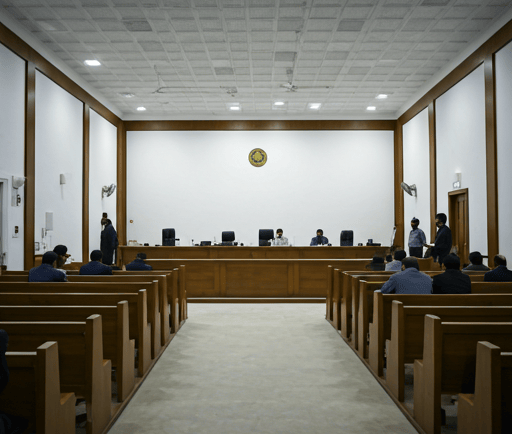Tel : 0191-3573899 Mobile : 9797690391 Mail : legal@emeraldco.in | Chamber : 28 A/C Green Avenue, Near MRF Tyres Digiana, Opposite Pace Hyundai, Digiana, Jammu, J&K-180010.
(ONLY PAID CONSULTATIONS)
PWDV Act & Atul Subash Case: A Lawyer's Insight- DIVORCE LAWYER IN JAMMU
Explore the complexities of the Protection of Women from Domestic Violence (PWDV) Act and its implications in the Atul Subash suicide case of 2024. Gain insights from a renowned divorce lawyer in Jammu on protecting women's rights.
HARPREET SINGH- Advocate, Hon'ble High Court of Jammu and Kashmir
12/17/20243 min read


The Protection of Women from Domestic Violence Act, 2005 (PWDV Act) was enacted to address domestic violence in India comprehensively. This progressive legislation aims to safeguard women against physical, emotional, sexual, verbal, and economic abuse. However, its misuse and implications have sparked significant debate over the years, particularly in high-profile cases like the Atul Subash suicide case of 2024. This article delves into the nuances of the PWDV Act, its intentions, and the controversies surrounding its application, with a focus on its potential impact on the tragic demise of Atul Subash.
Overview of the PWDV Act
The PWDV Act provides a legal framework to protect women from domestic violence. It offers various remedies, including:
Protection Orders: To prohibit the abuser from committing acts of violence or entering the victim’s workplace or residence.
Residence Orders: Ensuring the victim’s right to reside in the shared household.
Monetary Relief: Compensation for loss of earnings, medical expenses, and maintenance.
Custody Orders: Temporary custody of children to the victim.
Counseling and Shelter Homes: Access to psychological counseling and safe housing.
The Act defines "domestic violence" broadly, encompassing physical, emotional, sexual, verbal, and economic abuse. While this inclusivity has empowered many women, it has also led to allegations of misuse.
The Atul Subash Suicide Case: A Brief Overview
Atul Subash’s suicide in 2024 has become a flashpoint in discussions about gendered legal protections in India. A young professional with a promising career, Atul allegedly ended his life due to prolonged stress stemming from domestic disputes and accusations under the PWDV Act. His death has reignited debates about the misuse of legal provisions and the lack of safeguards for men falsely accused of domestic violence.
Reports suggest that Atul faced allegations of abuse from his spouse, who sought relief under the PWDV Act. Friends and family claim these accusations were baseless and led to significant mental and financial strain on Atul. The case underscores the need for a balanced approach to domestic violence laws to prevent both abuse and misuse.
Intricacies of the PWDV Act
Broad Definitions:
The Act’s broad definition of domestic violence ensures that various forms of abuse are covered. However, this breadth can sometimes lead to subjective interpretations and frivolous complaints.
Prima Facie Relief:
Courts often grant immediate relief to complainants without thorough investigation, aiming to protect victims. While well-intentioned, this can lead to undue hardship for the accused if the allegations are unfounded.
Role of Protection Officers:
Protection Officers are pivotal in implementing the Act. However, their limited resources and training often hinder their ability to discern genuine cases from false ones.
Impact on Mental Health:
Prolonged legal battles and societal stigma can severely affect the mental health of both parties. Accused individuals often face public vilification, as seen in Atul’s case.
Addressing Misuse and Ensuring Justice
While the PWDV Act is a vital tool for combating domestic violence, its misuse cannot be ignored. The following steps can help address these concerns:
Gender-Neutral Provisions:
Expanding the scope of the Act to include male and other gendered victims of domestic violence can ensure equitable justice.
Stronger Screening Mechanisms:
Establishing mechanisms to assess the veracity of complaints before granting interim relief can reduce instances of misuse.
Mental Health Support:
Providing mental health counseling for both complainants and accused individuals can mitigate the psychological impact of legal proceedings.
Punitive Measures for False Complaints:
Introducing stringent penalties for filing false complaints can deter misuse without discouraging genuine victims from seeking justice.
Relevance to Atul Subash’s Case
The Atul Subash case highlights the urgent need for a balanced approach to domestic violence laws. While protecting women from abuse remains paramount, it is equally important to safeguard individuals from false accusations and the resulting mental anguish. Atul’s death serves as a tragic reminder of the consequences of overlooking this balance.
The case has also reignited calls for reforming the PWDV Act to prevent misuse. Policymakers must address these issues to ensure that the Act serves its intended purpose without causing undue harm.
Conclusion
The PWDV Act is a cornerstone of India’s fight against domestic violence, offering crucial protections for women. However, cases like Atul Subash’s underscore the need for nuanced reforms to address its misuse and ensure justice for all parties. By adopting a balanced approach, India can uphold the Act’s spirit while preventing tragic outcomes like those witnessed in this case.
At this moment we express our solidarities with all those who have succumbed to the toils of the misuse of this act and hereby pledge to assist genuine and bonafide cases for weaker sections of society on probono basis in all matrimonial cases such as divorce, maintennance and domestic violence in courts of law in Jammu and Kashmir. #lawyersforchange #lawyersinjammu
ADVOCATE HARPREET SINGH Ph : +91-7889792056 advharpreetjkhc@gmail.com
Expertise
Specializing in corporate law, handling civil, criminal, and corporate cases.
Contact
Services
legal@emeraldco.in
0191-3573899
Mob : 9797690391
© 2024. All rights reserved.
